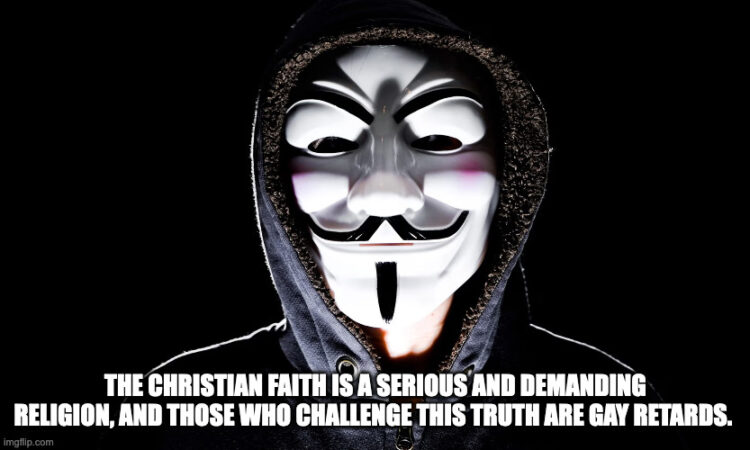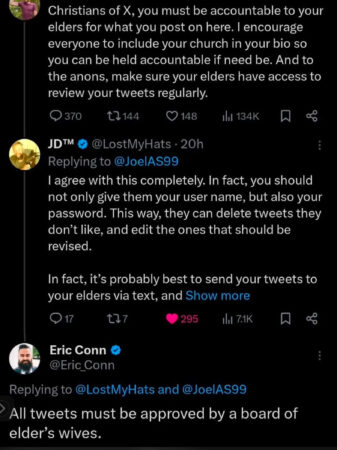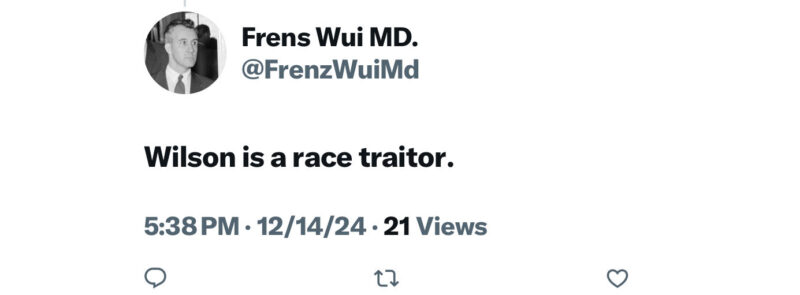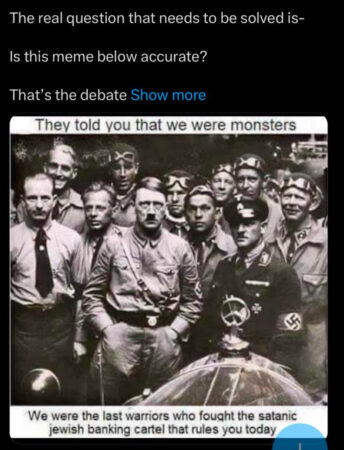Introduction
Some of the recent online polemical disputes and such have raised the question of anonymous battle-bot accounts (or anons, for short). Let’s think about it for a moment, shall we? What is the theology of the thing?

On the one hand, we all instinctively know that there are times when anonymity seems to be called for and is fully legitimate. Think of the 16th century Martin Marprelate, who published a series of hilarious pamphlets at the expense of the Anglican bishops, who had “learned their catechisms and were past grace.” Or think of the heroic samizdat publications during the commie times. These were people who really were speaking truth to power and, had they been caught, Martin would have been executed, and a happy outcome for the samizdat guys would have been Siberian in nature.
But we also know, again instinctively, that there is something profoundly unsettling and sinister and wrong about giving any credence whatever to any anonymous accusers or railers. We wouldn’t accept anonymous accusations that someone mailed to a trial in a Unabomber envelope. In biblical law, in order to testify against someone in court, the witness had to be in a space where he also was to be held accountable. The ninth commandment forbade perjury, bearing false witness (Ex. 20:16), and so the testimony needed to be received in such a way as that the witness had skin in the game also.
“Then shall ye do unto him, as he had thought to have done unto his brother: so shalt thou put the evil away from among you.”Deuteronomy 19:19 (KJV)
In order to do to the witness what he thought to do to the accused, you needed to know who the witness was.
So how do we tell the difference? What are the principles?
The Foundational Issue
Asking whether or not you are for or against anons really is a confused way to ask the question. What is the anon doing exactly? Which anon are we talking about? “Are you for or against bottles with pills?” Well, is it medicine or poison? “Are you for or against sexual intercourse?” Well, is it marital lovemaking or rape? “Are you for or against assassinations?” Well, is it Ehud or Hinckley? “Are you for or against political treatises?” Well, is the Federalist Papers or the Nashvilled shooter manifesto? To repurpose Lenin’s two great questions . . . “Who? Whom?”
As I never tire of saying, there is no virtue or vice in a transitive verb. We don’t know whether to praise or blame until we get to the direct object. “I love fill-in-the-blank.” What is the direct object there? Is it God? the devil? apple pie? child porn? sunsets on the beach?
So some anons can be heroic. Some are clever. Some are lame. Others are simply vile. If you want to praise someone simply for being anon, I somehow feel like you have set the bar way too low.
To repeat the question, how do we tell the difference? What are the principles? One of the first principles is to realize that “anons” are not a monolithic block. Anons, like the general population, range from criminals to heroes.
Posing the Question One Way
The answer to the question posed this way is really straightforward. I would never dream of attributing unique malevolence to “men with anon accounts.” See above. I do, however, reserve the right to attribute malevolence to the accounts that are festooned with the blossoms of manifest malevolence. You know, in the things that they say. If I can judge a tree that I know through the bitter fruit (Matt. 7:17-18) then to judge a tree that I don’t know, the only thing needful is to have a box of the fruit shipped to me, which the Internet thoughtfully does. “I don’t know what state this tree is growing in, but man, this fruit is rancid.”
In the same way, I have no trouble attributing malevolence to malevolent Jews. When bad people do bad things, we should always be willing to say they were bad. When anons do bad things, we should be willing to say the same thing. The thing that is troubling about our current situation is that there is a small but enthusiastic regiment of right-wing troll-anons whose manifest misbehavior is apparently invisible to men who ought to know better. Generals always need to have good control of their troops. But the idea appears to be “so long as they are attacking leftist retards, we will ignore their obvious ungodliness.” I will give some examples in a minute.

The thing that is astonishing to me is that occasionally I will get a sincere question in the middle of a comment thread that is currently at 178 comments, a comment thread of the grease fire variety, and this sincere brother comes into the chat to say something like “but what is your evidence that this perspective is motivated by seething hatred or crackling envy?” From which I conclude that his computer must have lost all functionality when it comes to scrolling up and scrolling down. For the comment right above his was “enough from you, you sad little Jew-puke,” and the one just below was “all race traitors should be tied down on an ant hill and smeared with honey.”
Accountability for words and actions is a thoroughly biblical practice. But from Eric Conn’s dismissal to the right here, you would think that anons don’t need or require actual pastoral care, especially the dank anons. I, on the other hand, think that a number of these anons need to be checked into a pastoral ICU somewhere.
Joel Webbon Sics the Anons on Owen
Important prolegomenon to the following: I snipped these clips as they went by in my feed, and know nothing at all about @HasBrainCanRead. I might not be in sympathy with her project at all and sadly—as these things sometimes go—she might be really dismayed that I mentioned her at all.
That said, I do want to respond to what Joel Webbon says here in these two clips.
So Joel here says that there is a biblical case that can be made for mocking. This is true. Elijah mocked the priests of Baal on Mount Carmel. Jesus mocked the Pharisees. Amos mocked the cows of Bashan. A biblical case can be made for it. The problem is that Joel is not making it, and he is not restraining or disavowing those anons who are trying hard to be as foul as the apron of a scullery maid in the devil’s kitchen.
I recently had a discussion with Lennox Kalifungwa of New St. Andrews College about a worldview approach to ethnicity, and here is a sampling from the comment thread. This is the kind of thing that happens routinely whenever we touch on these subjects. Incidentally, I do not say these guys are Joel’s anons because who knows? They’re anons. But when the call for volunteers goes out, these are the kinds of guys who show up.





Ah, yes. “Uniquely in touch with the metaphysical.” What a poor, raggedy thing the gospel was—struggling along as it did until it finally scored the endorsement of the white people!
The previous paragraph, by the way, was an example of biblical mockery.

Joel acknowledges that it is possible to have unbiblical mockery, but then urges the anons to harry Owen Stachan off Twitter—not having any idea a priori whether or not the people who would do this bit of dirty work for him are in the biblical category or not. I say a priori because after they get to work, the whole world can usually see how toxic they are.
But Joel could say that he was only issuing his a apriori appeal to the ones who would conduct the work of mockery biblically. But if they are anons, he has no idea who they are, or where they are coming from. No idea. No accountability for them whatever. So let’s say ten new anons go after Owen, as per the exhortation. Ten. Two of them are currently under church discipline for disturbing the peace and purity of their local congregations. One of them is FBI. Another three are trolls who work for Right Wing Watch, hoping to provoke Joel himself into saying something really silly that they could use. And the remaining four are aficionados of Right Response Ministries who think they are just following instructions, and so what they do they do both earnestly and badly. And then, after they begin their spewing, the sinful nature of their blatant behavior is ignored because there is a category out there called “biblical mockery.” In a book somewhere.
Well, yes, there is such a thing as biblical mockery. Show me some, because it sure isn’t going on around here.
So here is an invitation or a challenge to Joel, and with no guile. Please name five right wing anon accounts that you believe are disgracing the gospel, accounts that are doing what you said, attacking Owen, but they are doing it unbiblically. I am grateful for the fact that Joel signed Joseph Spurgeon’s statement on natural affections which condemned Nazis—that was really good, and about time. But I am not here talking about Nazi/not Nazi, but rather about godly anons/ungodly anons. I am talking about the kind of anonymous nastiness that could cause Owen to depart from Twitter. Please name five who are doing what you said in a way that displeases you. This is so that when you say that it can be done unbiblically, we know that you are not talking about a null set.
And to those who throw this same challenge back at me, telling me to do the same kind of thing, I simply say . . . I am doing it now.
A Wide Range of Options

One the one end, we have a guy who has a wife and four kids, is a faithful church member, and he feeds all of these dear people by means of a job he has in Corporate America. The challenge for him is that his company has an HR department that is hopped up on diversity steroids. So this guy has an anonymous account in order to express sentiments like “women shouldn’t be stationed on submarines,” or “we ought not to spend more as a nation than we take in through revenue.” He needs to be anonymous because he would lose his job otherwise—and all for observing that the sky is blue, that the grass is green, and that three centuries ago, the pope used to be Catholic.
But on the other end, the gnarly end, we find someone who would also lose his job, and good riddance. He uses his anonymous account in order heap scurrilous abuse on anybody who crosses him in any way, and he is particularly savage with regard to ministers of the Word. He is a walking embodiment of what the psalmist complains about.
“For look! The wicked bend their bow, they make ready their arrow on the string, that they may shoot secretly at the upright in heart.”Psalm 11:2 (NKJV)
Just think. If someone had only gotten Shimei an X account, he could have set himself up as @JoJoManofBenjamin, the wittiest and most pointed of all the anons (2 Sam. 16: 5-13). I believe that he could have done himself proud. I also think that David, on his death bed, would still have told Solomon to track that guy down.
When the Cover Is Blown
The basic rule of thumb should be this. Suppose an anon account has been carrying on in some way, and he accidentally outs himself. Nobody else does that to him, so we can leave that question out of our casuistry. He accidentally reveals his identity to the world.
In the real world, he has a family, he has a church, and he is a citizen. These are three governments that have a responsibility from God, according to their structure, to regulate the behavior of their members, including this guy. If the anon was one of the sons of Eli, and he was posting salacious memes about the women who served at the tabernacle, then Eli would need to do something (1 Sam. 2:29). If the anon was a church member, outwardly dutiful, but online he consistently mocked and attacked the pastors and elders of the church he was part of, then those same elders would need to do something about his overt dishonor (Heb. 13:7, 17; 1 Tim. 4:12). He took a vow to uphold the peace and purity of the church, and he is clearly a covenant breaker. If the anon was engaging in defamation, slander, or threats—of the kind our guys regularly receive—then when his identity is revealed, the civil magistrate has the authority to investigate, and prosecute as appropriate (Rom. 13:1-7).
In short, if the anon activity is actionable activity (without any injustice) in any of these three realms, then the anon account is illegitimate. A man has no right to do anonymously anything that is immoral or criminal. If the anonymity is protection against righteous consequences, then the anonymity is sinful. If it is protection against unrighteous consequences, then it is not.
Job Security?
But one more area needs to be considered, which would be to ask what authority the anon’s employer might have. If the employee is serving the employer “at will,” the employer has the right to let that person go. He actually has the legal right to do it for no reason at all.
But following the Golden Rule, which is to do as you would be done by, the employer would still have the right and responsibility to take action if the anon activity were detrimental to the business, or radically inconsistent with it. These activities might or might not be actionable by family, church, or state, as mentioned above—but would certainly be actionable by an employer. Say the kindergarten teacher at your local Christian school is discovered to have a raunchy OnlyFans account. Or say that an employee at McDonald’s has an account dedicated to dissing McDonald’s and singing the praises of Burger King. There is no reason why McDonald’s should keep him on. Or let’s say the sandwich maker at a kosher deli is found to be running an online Free Palestine campaign. And before you run to your keyboard to call me a Jew-puke, the same principle would apply here if a supplier of halal foodstuffs was found to be running a Stand With Israel website. In a free country, businesses should be allowed ordinary measures to protect their brand. Such ordinary measures are not cancel culture.
With regard to employment, the one thing that we should all stand against is the concerted and contrived efforts by any mob, left or right, to cancel a person’s livelihood simply for being out of step with their political agenda. What this kind of pressure does is create an artificial and temporary controversy designed to strong-arm a business, and it is simply an approach to life that puts thugs in charge. “Nice little business you have there. It would be a shame if it employed any Republicans.”
E.g. the Thomas Achord Case
Prior to the publication of Stephen Wolfe’s book, an attempt was made to get us at Canon to cancel the book because of Stephen’s association with Thomas Achord. Achord was accused of saying some vile stuff online through an anon account, a charge which he (at the time) denied. Our response was therefore to tell the cancelers to pound sand. A bit later, as the story was unraveling, I also wrote this piece. I would urge everyone who thinks we are being soft on such issues to read through it carefully. We were not about to cancel Wolfe simply because Achord had become a designated target. At the same time, this stand of ours provided no protection at all for Achord. He was the one who had done some bad things that had harmed himself and his family. He was the headmaster of a classical Christian school, and what he had done was inconsistent with the mission and reputation of the school. He had been a dark anon, and then he had lied about it. He had to go. Play stupid games, win stupid prizes.
In a free country, employers should have the legal right to dismiss employees who embarrass them, or bring some kind of shame or disrepute on their company. By the same token, in a decent country, activists should not harass a company to get them to fire someone simply because that person holds to a particular set of political beliefs. This distinction is not a complicated one.
But someone might object. What if it comes out a couple years from now that Stephen Wolfe knew about Achord all along, and agreed with all the dark stuff he said? That would not reveal the true meaning of The Case for Christian Nationalism. It would rather be an odd case of an author coming out to disagree with his own book, and we would deal with it accordingly. But in the meantime, we have no reason to think that Stephen has done or is doing that. It is fair to say, however, that he does feel sorry for more of these sad puppies than he ought to. Stephen does have a soft spot in his heart for people who have a soft spot in their heads.
And this is as good a place as any to make an essential clarification about what I mean by Revoice for Nazis, and how it would apply to men like Wolfe, Webbon, Conn, et al. To say that someone is not handling the dank right properly is not to say that they themselves are part of the dank right. A doctor can mishandle a case of gangrene without being the gangrene itself. A hireling can run from wolves without being a wolf. To be part of the general problem is not necessarily to be a specific part of the problem. At the end of the day, Tim Keller would come down on the right side of the homosexuality question. He would handle it with a great deal of nuance, like a donkey eating a thistle, but when all was said and done, he would say something like homosexual behavior is “not consistent with human flourishing,” or something like that. So I am not saying that Conn, or Webbon, are crypto-Nazis. There is clear evidence that they are not. I am saying that they are displaying a calloused pastoral ineptitude when it comes to understanding and responding to the dank anons.
Many people believe that they want to keep their privacy, when what they actually want is to preserve their anonymity. The wiles of dopamine can make people think the craziest things. A number of years ago, a married couple made a porn tape, posted it, consequently got fired from their jobs, and then sued because their privacy had been invaded.
In a similar way, suppose we have a particularly pestilent anon named @BasedSonofJapheth, and he consistently rails against Jews, blacks, commie progs, and James White. And then one day, he is toppled from his perch because an auto-fill mistake in a cc line revealed his identity to his employer. When he gets the sack, is his right to earn a living being violated? Is his privacy being invaded?
He was only being private the way a sniper in the bushes is being private. Such an approach to privacy does tend to arouse the interest of those getting shot at. They become curious. They take an interest in subsequent events.
Idle Words
Everything Scripture says about the tongue applies to keyboards.
“But I say unto you, That every idle word that men shall speak, they shall give account thereof in the day of judgment.”Matthew 12:36 (KJV)
One of the things that astonishes me is how quickly some Christians have abandoned their commitment to the authority of Scripture just because the hell and destruction of clicks (“More! More!”) demanded it (Prov. 27:20). But death and life are in the power of the tongue (Prov. 18:21). The perverse tongue falls into mischief (Prov. 17:20). A lying tongue will betray the liar (Prov. 26:28). The eager reader of perverse liars is a liar himself (Prov. 17:4). Liars only last for a moment (Prov. 12:19).
Froward fingers, typing madly, shall be cut off (Prov. 10:31).
That Penultimate Section is Rich Coming from You, Wilson
But didn’t you start all this, Wilson? Weren’t you the aboriginal bad boy, writing the way you do in that shock jockey épater les bourgeois manner you have? Don’t you take any responsibility for this deterioration of evangelical discourse?
No, and here’s why.

I am reminded of the Harry Truman anecdote, where someone in the crowd shouted, “Give ’em hell, Harry,” and he responded with “I just tell the truth, and they think it’s hell.”
I am going to ask you to follow me closely here. There is a vast difference between saying biblical things and being accused of being unbiblical, and saying unbiblical things and being accused of being unbiblical. I know there are nuances here, and I accept that. But there is no faster way to get accused of being unChristlike than to flip over a few tables belonging to the money changers.
This, however, does not justify first century bank robbers, whose behavior really would be unChristlike.

